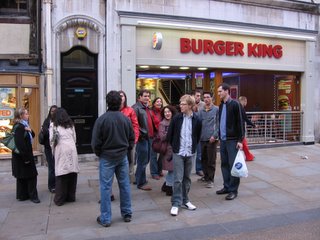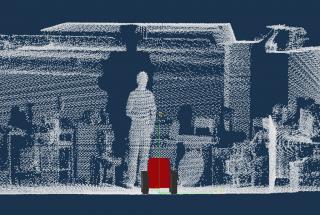
This morning, as on previous mornings, I’ve been reminded how the panopticon is more of a panaudiocon. Despite my total lack of an alarm clock, I’ve been awake before 9:30am each day. This is something I would have been hard pressed to do in Vancouver, under such circumstances and when going to bed around 2:00am, but here it has been automatic. Less automatic today, I suppose, when one of the ‘scouts’ and I were able to terrify one another quite thoroughly when she came striding through my unlocked door as I was asleep. Despite that minor incident, life here is developing as before. A number of other people have now moved into Library Court and the staircase that you must pass through to get here. In England, it seems, the word ‘staircase’ can denote a dormitory.
I took my first books out of the Wadham Library this morning, which was a delight. I found Hollis and Smith’s Explaining and Understanding International Relations through the Oxford Libraries telnet service. Right beside it, I found the Bull’s The Anarchical Society and Carr’s International Relations Since the Peace Treaties: classics, both. The process of withdrawing them was equally excellent. I just scanned my Bodeleian card, still bearing a misspelled name, and then the books.
This afternoon, I read the articles by Simon Critchley that Tristan sent me in response to my general hostility towards critical theory and abstract analysis of international relations. Personally, I feel more sympathy towards a view of Marx that is much more critical than Critchley’s, though reading the articles was interesting – despite what a small fraction of them I understood. Reading these articles is exactly like reading a complex book in French, where I have only the vaguest sense of what all the complicated words mean and where I struggle along looking for short and straightforward sentences that can be the anchors of my shaky understanding.
Critchley’s second article, on Derrida, makes reference to “patient, meticulous, [and] scrupulous” reading. Stressing the importance of that probably highlights the major difference in approach between philosophers and me. I don’t do patient, meticulous, or scrupulous reading. Reading is a springboard into new ideas: part of a breathless race into territory that at least seems new. Taking on a new text is just a way of getting a few more girders to hold up the causeway you are building for yourself. Maybe that is sloppy scholarship, and I am not particularly keen to defend it, but it seems to me that if we want to change the world, we don’t have time to “read… the text in its original language, knowing the corpus of the author as a whole, being acquainted with its original context and its dominant contexts of reception.” Doing so is a kind of prison; it allows you to perform startling feats of analysis, but principally ones that can only be understood by fellow initiates. Through the process of becoming de-alienated from a particular author, you become alienated from the rest of humanity, Still, I am quite willing to accept that philosophical texts ‘stay fresh’ for longer than works in international relations or environmental politics do. Perhaps that means that enough people can develop an adequate corpus of knowledge for broad debate on technical matters to take place. Whether such debate actually tangibly impacts the rest of the world, however, I remain profoundly uncertain about.
After reading for a while, I met with Joanna Coryndon again to have my Bodleian card corrected. I also started the week long process of opening a bank account and getting a credit card here, as well as having some photographs of myself printed for the college. My second foray to Sainsbury’s involved the acquisition of large amounts of organic vegetables, six kinds of cheese, and many bagels.
In the evening, I met Abra, Ben, and several others who were on their way to get some dinner. We ended up meeting about fifteen people outside the Burger King on the high street. All were Canadians, and we introduced ourselves to one another by hometown and academic specialization. It struck me as vaguely odd, right off, that a large contingent already seemed to know one another quite well. In the end, we went to The Head of the River: the pub right beside the Folly Bridge. There, I learned that I was sitting at a table with six of the Canadian Rhodes Scholars – members of the group I had perceived the outline of beforehand. While quite intellectually intimidating, it was also quite thrilling. To be living twenty metres from a Rhodes scholar and to have the email addresses of two others in my wallet is an odd sensation.
After leaving, we walked back to Wadham by means of Magdalen College, where one of the most interesting Rhodes Scholars I met is living. Back in Wadham, we visited the bar in the JCR for the first time. In my case, two more pints of Guinness were added to the one I had already consumed – a progression that partially explains my lack of desire to write at too great a length about tonight’s happenings.
Suffice it to say that I met an interesting young student of literature at the JCR, who is also a photographer in possession of one of the best accents I have ever encountered. I hope it will not be our last meeting. Once Andy, Ben, Kelly, etc. departed from the bar, I was left talking fruitfully with Nora. From there to an eventually rather rain-swept bit of roof near Library Court, we spoke for another couple of hours. I am a bit hesitant to write about it because I think it more than likely that she will eventually find her way here. It’s not that I couldn’t post a transcript without embarrassing her intellect in the slightest; it’s a matter of disclosure and non-disclosure.
I wonder how long it will take for Oxford water to be the ‘normal’ or baseline water for me. Quite possibly around the time when my current kind of tea, brewed in such water, eclipses in my mind the primacy of the Murchie’s Earl Grey to which Kate first introduced me, and which I sat sipping at kitchen tables in Fairview with Meghan and Tristan for hours on end.
Things I need:
- More towels
- An alarm clock that doesn’t get fried by 240V power
- French press
- A second pair of dark, non-torn pants

